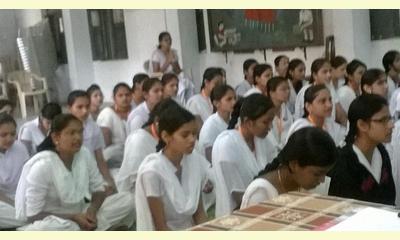|
|
India: Training in Peace and Human Rights
an article by Balkrishna Kurvey, Indian Institute for Peace, Disarmament & Environmental Protection (abridged)
EIP-India as a part of EIP-International Geneva (World Association for the School as an Instrument of Peace) arranged a one day EIP-Training for the students of Yashodarabai Khare Junior College of Education on March 15. The students, girls from 19 to 25 years, will join the schools as teachers after a two year diploma course in education they .

click on photo to enlarge
The theme of the training was “Peace & Human Rights through Education.” 64 students and 7 lecturers actively participated in the EIP training.
Dr. Nalini Kurvey, on behalf of EIP India, EIP International and IIPDEP welcomed the teachers and lecturers. She said that EIP India started working since 1995 under the guidance of EIP International. EIP-India has conducted many national/provincial workshops/seminars/training for teachers, NGOs and Government officials in many cities in India. Trained participants from such training sessions are organizing seminars and short training sessions in their respective areas of working. . .
She informed the teachers about the role of schools as below:
1. The school as at a service of humanity.
2 The school paves the way to mutual understanding for all the children of the world.
3. The school teaches respect for life.
4. The school teaches tolerance, that quality which helps to accept attitude and behavior that are different from his/her owns.
5. The school develops sense of responsibility, one of the greatest prerogatives of man. The more his condition improves the greater of the responsibility he/she must assume.
6. The school teaches the child to overcome his egoism.
Out of these, the first one is the most important, that means school prepares the child to be a good human being. . .
Balkrishna Kurvey of EIP-India made his power point presentation. He informed the articles of Universal Declaration of Human Rights through pictorial and many examples & stories. Kurvey informed in detail the articles of Human Rights and its need for the implementation in India and developing countries for peace, development and safeguarding democracy. . .
Mrs. Vishakha Bagde, Principal, of Yashodarabai Khare Junior College of Education in her concluding address stressed the need of peace and human rights education for the teachers who are going to teach the students. The EIP training will surely benefit the students, who after the diploma in Education will join various institutions/schools. What they will learn in this training will benefit them as well as their students. Teachers if rightly informed regarding the importance of peace and human rights will teach to students who are going to be future citizens of the country. . .
A workshop for the students was arranged after the first session. Participants were divided in small batches and given some questionnaire to discuss among themselves and submit the report in joint meeting.
Students asked many questions on various roles of Human rights. Balkrishna & Nalini Kurvey answered the questions. This was one of the most active sessions where all participants participated.
|








|
DISCUSSION
Question(s) related to this article:
What do you think of this curriculum for training peace educators?,
* * * * *
Latest reader comment:
The Campus Peace Educators Training Program (Abuja, Nigeria, May 2007) shall cover the following curriculum :
- Introduction to Integrated Campus Peace Education (Campus Peace Keeping, Campus Peace Making and Campus Peace Building Techniques)
- Universal Principles for Peace
- Human Development and Character Education
- Campus Conflict and Violence
- Fundamental Principles of Campus Peace Education
- Educating for Peace on Campus
- Principles and Techniques of Campus Conflict Resolution
- Teaching Methods and Principles
- Programs and Policies for Campus Peace (UN Peace Day, Campus Peace Day, etc)

|
|









